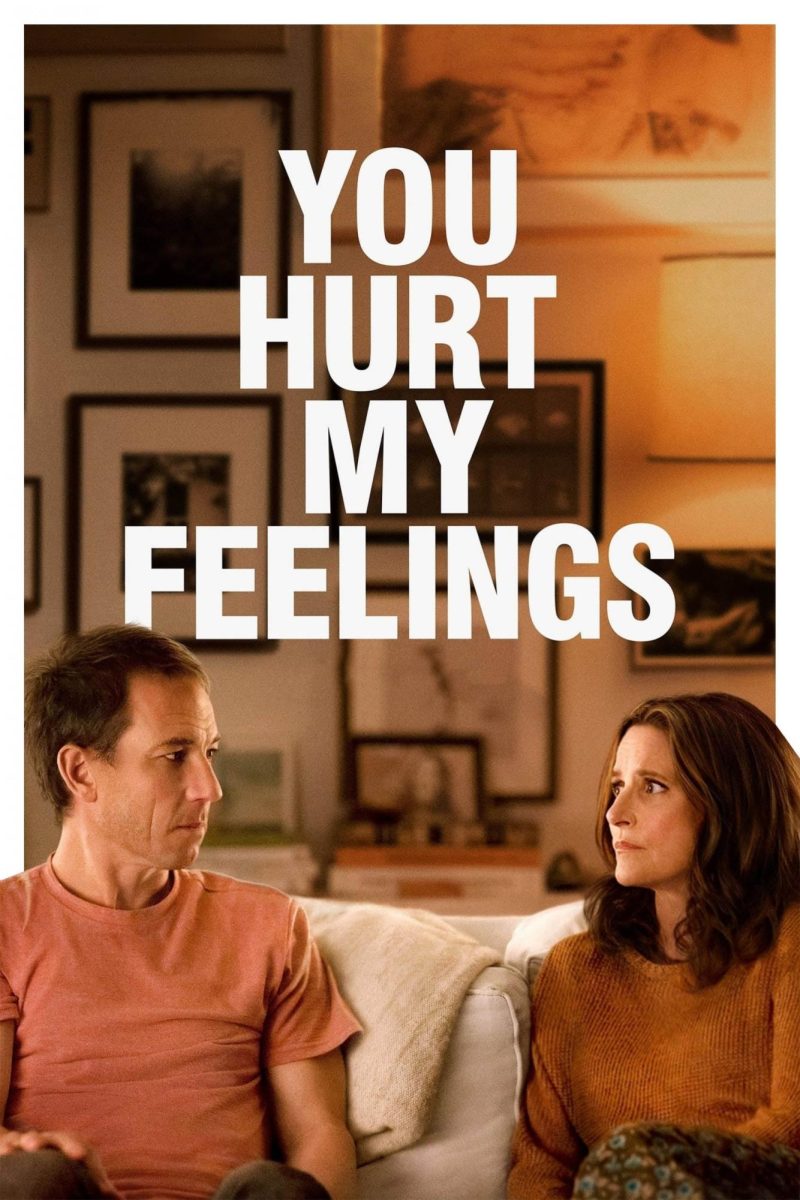If it weren’t for comedies like “You Hurt My Feelings,” I’d lose faith in the genre’s ability to produce candid and touching films.
Beth, a writer who recently finished her final draft for her first novel, is in a loving marriage with her husband Don. Don is a therapist, though he has felt disconnected from his patients recently. After submitting the final draft of her novel, Beth’s publisher rejects it, saying she’ll need to make a few revisions. In spite of Beth’s editor, Don suggests she hire a more enthusiastic publisher and says he loves her novel. But, while out sock shopping with Beth’s brother-in-law Mark, Don admits he doesn’t like Beth’s novel. Eavesdropping on the conversation, Beth’s upset by Don’s comment, and resents him, even to the extreme of refusing to speak to him.
What resonated with me throughout the movie was the writing and the acting.
Writer and director Nicole Holofcener offers effective dialogue that’s both grounded and profound. Though the characters live within their own “narcissistic worlds,” as Beth puts it, they offer insight into our own lives in the meantime.
Beth, for a time, refuses to tell Don she overheard his admonishment of her work. But, why?
In the scene following her breakdown after hearing him, Sarah, Beth’s sister, takes Beth back to her apartment, sits her down, and in a cloud of commiserating smoke, talks about it. At one point in the conversation, Beth wonders what Sarah thinks of Mark in his creative profession as an actor.
“But sometimes you think he’s good?” Beth wonders.
“Yeah, definitely.” Sarah admits.
“So, the times when you don’t think he’s good, what do you say to him?”
“That he’s good,” Sarah responds.
“Well, what if he found out that you were lying?” Beth inquires.
“He’d croak.”
“Well, I wanna croak,” Beth cries.
Is it better to hear the truth? Beth questions this, yet she has a difficult time being around her prickly mother who has early-stage Alzheimer’s and who always expects her to do better.
Beth’s refusal to admit to Don what she knows, and has been dwelling on, hurts their relationship. In some of the better examples of the main cast’s performance, we see Don shocked, dismayed and unsettled by Beth’s little passive-aggressive behaviors. She won’t sit next to him while they’re talking with their son, Elliot, about how his twenty-something life is going. She won’t respond to him calling her name while they’re cohabiting their apartment. Worst of all, she’s sleeping on the couch.
Holofcener’s script defines the fine line of what justifies the white lies we tell our friends, family and even acquaintances to satisfy them, let alone upset them.
It’s best that Don and Beth be supportive of their son, despite his discouraged attitude.
But, in the case of Don’s patients, it’s better that they be honest with him about how they’re progressing under his care.
One of these patients, Jim, played with brilliant dryness by comedian Zach Cherry, obviously doesn’t find Don helpful. In his first conversation with Don, Jim mutters, “God, he’s an idiot,” without first leaving the video call. Again, in their second chat, Jim leaves Don’s office and, in the hallway, says, “So fucking pointless.”
Don is essentially experiencing the same lack of honesty as Beth, and this is Holofcener’s way of telling us, as an audience, that we’re better off telling the truth.
It’s the incessant question of what we got wrong, what we could’ve done or what the other person was expecting. Without either of these questions being answered, we’re left to obsess over what we’re not getting right. Holofcener thinks that telling the truth, as much as it may hurt in the beginning, is ultimately for our betterment.
She suggests the best way to resolve tension between ourselves, like that between Don and Beth, is only through honest discussion. “Why did we lie to each other for so long?” is on both Don and Beth’s minds in a penultimate discussion in the film. One of these lies is about each and every draft she gave him. Countless times, he told her he loved it. But, as Beth found out earlier, he never truly did. He was being “encouraging,” according to his own words.
Julia Louis Dreyfus, in the starring role as Beth, is subtle. She doesn’t give an overt, gawking performance like you would see with an amateur comedian-turned-actor.
She is an example of wonderful casting, alongside Jeannie Berlin as Beth and Sarah’s forgetful mother and Michaela Watkins as Sarah.
In a hilarious back-and-forth between Beth and Sarah, they’re handing out clothes to the homeless. It’s a debate over whether they should, or really could, give away an old shirt their mother hasn’t worn in many, many years. It’s only once they give it away that they decide it really can’t be given away and awkwardly tell a homeless woman she has to put it back.
There are seemingly countless moments like this in “You Hurt My Feelings” that come naturally as examples of both effective writing and superb acting. It’s now available for purchase on AppleTV.







